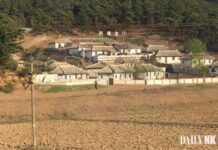On the heels of the warm welcome extended by China’s foreign minister to his North Korean counterpart at the ASEAN Regional Forum in Vientiane, Laos, speculation is mounting over the possibility that Beijing and Pyongyang might be seeing a new era of rapprochement.
The preceding one-on-one talks with South Korea’s top diplomat Yun Byung-se and Chinese Foreign Minister Wang Yi, which put on display Beijing’s deep dismay with Seoul’s decision to deploy a U.S. missile defense system THAAD to the South, played a significant part in fueling such speculation. Wang was seen resting his head on his hands or making dismissive hand movements during the talks–gestures considered as contrary to diplomatic protocol–which, on its face, lends further credence to such claims.
However, as Daily NK’s foreign ministry correspondent, this reporter was told by multiple diplomatic sources that the recent incidents fail to offer sufficient grounds to suggest Beijing will challenge the global community’s push against Pyongyang’s nuclear ambitions. Instead, they point out the actions may have all been part of a ‘staged performance’ by China, looking to flaunt its influence over Pyongyang ahead of the official ASEAN Regional Forum foreign ministers’ gathering, where it would have foreseen discussions taking place over the THAAD deployment issue.
Rumors allegedly circulated among those on site that, after reporters left the meeting room, Wang continued to discuss other issues on the agenda with Yun in an amiable atmosphere, dropping the previously aggressive tone he took when talking about THAAD.
The lack of public consensus in South Korea on the THAAD deployment may have convinced China that a symbolic message conveyed in a strong tone to be a suitable response. Many of these diplomatic sources asserted that Minister Wang’s hand gestures to Minister Yun as well as his attitude toward Ri Yong Ho were carefully calculated moves.
Beijing has often times in the past taken aggressive measures in diplomatic rows, cutting ties in severe cases or simply ignoring its counterparts in diplomatic encounters. It once, for example, put in place a de facto ban on rare earth minerals exports to Japan due to the dispute over the Senkaku Islands in Japan and Diaoyudao Islands in China.
However, despite the difference in opinion over THAAD, Wang Yi still sat down on the first day of his arrival at the ARF meeting with Minister Yun and engaged him with encouraging words like “colleague’ and “communication” during the one-on-one, suggesting it is too early to believe Seoul and Beijing relations have cooled off.
These sources pointed out that, considering the fact that Wang expressed his commitment to the denuclearization of the Korean Peninsula during talks and vowed to uphold UN sanctions, it would be a leap to suggest his ‘warm welcome’ toward Ri Yong Ho carries any significance.
Moreover, they say, Beijing would have much more to lose over souring ties with Seoul even when taking the missile defense deployment into consideration. Given the fine balancing act it must play to navigate disputes with other nations over the South China Sea and Taiwan, upholding strong ties with Seoul may prove to be even more important down the line.



















